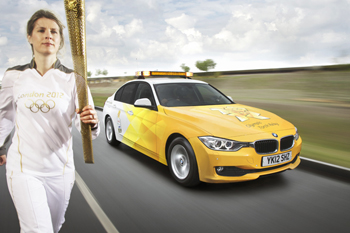At the Olympics, BP's biofuel hopefuls go for a test drive
 Athletes and officials riding in BMW’s special fleet of vehicles at the London 2012 Olympics might be the unwitting participants of an advanced biofuels trial.
Athletes and officials riding in BMW’s special fleet of vehicles at the London 2012 Olympics might be the unwitting participants of an advanced biofuels trial.BP, the official oil and gas partner of London 2012, will test three advanced biofuels in about 100 of the 5,000-odd vehicles that make up BMW Olympic fleet. Two of those fuels — a cellulosic ethanol product and a biobutanol biofuel — could be commercially available by 2014, BusinessWeek reported.
Commercialization is the critical step for any next-gen biofuels startup. The same rule applies for capital-rich oil majors like BP. Some oil companies stand to gain a great deal from the emergence of biofuels. Pike Research noted in a March report that Shell and BP were the top two oil companies with the best positioning to benefit from the growth of biofuels.
A closer look
BP is testing three advanced biofuels: cellulosic ethanol, biobutanol and a sugar-to-diesel product.
The cellulosic ethanol is made from energy grasses and then blended with the company’s BP Ultimate unleaded fuel. BP has invested in biofuels research since at least 2006. It wasn’t until BP’s $98.3 million purchase Verenium’s cellulosic biofuels business in 2010, that the company took serious steps towards commercialization.
BP is developing a 36-million gallon commercial-scale plant and 20,000-acre farm in Highlands County, Florida, where the energy grasses will be grown and turned into cellulosic ethanol. Construction has begun on the farm and work on the industrial facility is expected to begin this year and will take two years to complete, BP said.
BP’s biobutanol is made by the advanced fermentation of plant sugars by a special microorganism. The biobutanol used to fuel part of BMW’s fleet was produced at a demonstration plant built by BP and DuPont in Hull, England.
The sugar-to-diesel biofuel is at its earliest stage of development and likely won’t be ready for commercialization for some time.
BP has worked for years to develop a sugar-to-diesel technology that can be scaled up beyond the lab. In 2009, BP announced a joint development agreement with Martek Biosciences Corporation to advance the development of a technology for the conversion of sugars into biodiesel.
Back to the Olympics
The official Olympic fleet provided by BMW has to meet some stringent emissions requirements. The vehicles it supplies have to come in below 120 grams of carbon dioxide per kilometer. That’s 13 percent lower than the average emissions of vehicles in the UK.
In order to meet those requirements, BMW is supplying about 200 electric vehicles such as the MNI E and the BMW 1 Series ActiveE. Other vehicles include the BMW 320d Efficient Dynamics, which will be the main command car of the Olympic Torch Relay and the official vehicle for cycling events. BMW also is supplying about 400 bicycles and 25 motorcycles.
You can return to the main Market News page, or press the Back button on your browser.

